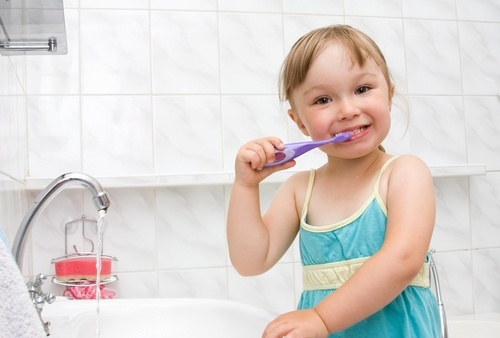
To build an effective family dental plan, it's important to carry over some of the things your kids learn in the dentist's office to your home. What better time to educate your kids than during February, which happens to be the 2016 National Children's Dental Health Month? After all, adequate oral care requires diligence, and visiting a dental health professional every six months won't be as effective if your little ones don't brush and floss in between appointments.
Of course, as with all things kid-related, parents need to apply some creative strategy for teaching their children the importance of oral hygiene. Here are some exciting ideas you can use with your family:
Use activities from the American Dental Association
As part of its campaign for National Children's Dental Health Month, the American Dental Association (ADA) shared several materials for teaching little ones about oral care. Parents and educators alike can benefit from these "Sugar Wars" games, posters and puzzles when passing down important dental information.
For example, the fill-in-the-blank Sugar Wars calendar encourages kids to brush twice each day for two minutes at a time. Meanwhile, the crossword puzzle provides a fun way for kids to learn that habits away from the bathroom sink - like eating a proper diet and protecting teeth while playing sports - can contribute to a healthier smile.

Engage your kids in dental education by downloading these entertaining apps.
Turn to apps for fun learning opportunities
You'd be hard-pressed to find kids who don't love playing with their parents' smartphones or tablets. Use your kid's keen interest in technology as a dental health educational opportunity.
Consider downloading the free Toothsavers application to encourage little ones to brush their teeth and teach them about oral hygiene. According to the application website, the game calls on kids to help heroes Toothy and the Toothsavers rescue characters from the dental spell cast by an evil sorceress.
Chomper Chums is another free application parents can use to help their kids understand how to maintain a healthy smile. In this interactive game, goofy characters - a lion, alligator or horse - instruct users on proper brushing techniques. For example, kids learn to brush each mouth quadrant for 30 seconds by chasing a sugar bug around the appropriate teeth for a designated period of time.
Learn lessons from the tooth fairy
Use the tooth fairy as a learning tool to educate your kids about the difference between "baby" and "adult" teeth. According to the Mayo Clinic, kids start losing primary teeth at about age six when permanent teeth start to emerge. Primary teeth still require proper oral care, as their presence helps with alignment of the permanent teeth. However, the development of permanent teeth provides a prime opportunity to stress how daily dental hygiene contributes to a healthy smile years down the line. Explain to your little ones that by brushing, flossing and visiting the dentist, they can keep their "adult" teeth white and in place their whole lives.

Help your little ones learn early on what constitutes a proper diet.
Play 'This or That?'
As you likely know, what you eat plays a crucial role in your dental health. According to Colgate, sugar and certain carbohydrates react with bacteria in your mouth to create acid, which can cause cavities. Additionally, poor nutrition can make you more susceptible to gum disease, bad breath and decay. Instead of reaching for sugary fruit juices and candy, opt for vegetables, whole grains and protein sources, like fish and beans.
During National Children's Dental Health Month, spend some time going over this topic with the "This or That?" game. Go through your refrigerator or pantry and take out two food items: one nutritious and one unhealthy option. For example, hold up an apple and a cupcake. After going over proper-diet basics, have your kids choose which food would help their smiles and which would hurt them.
Kids love all things sugar-coated, so even if they know that a celery stick is healthier than a chocolate bar, they might not be inclined to pick up the veggie option. Nonetheless, it's still important that they are at least aware of what foods contribute to a healthier mouth.
To achieve healthy pearly whites as adults, your little ones must start practicing proper oral hygiene habits at an early age. Use some of these tactics or ask your dentist for ideas.
